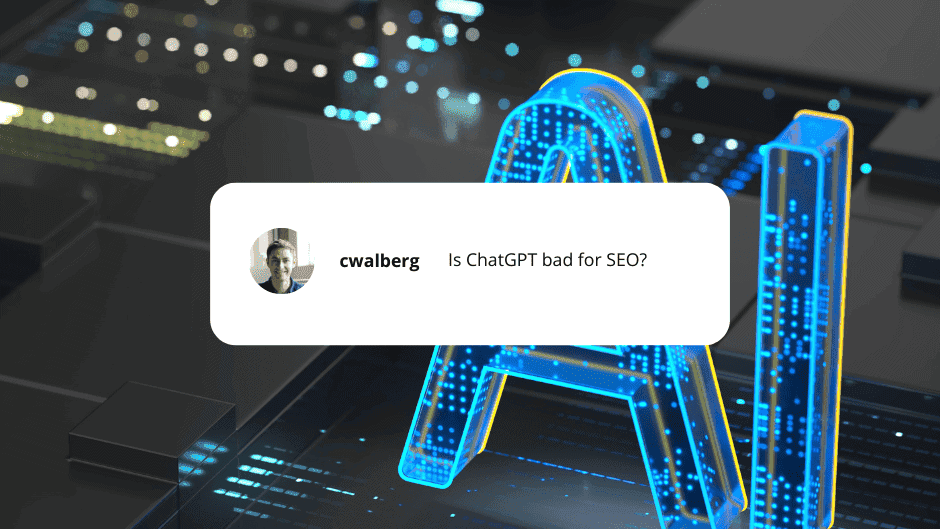Is ChatGPT Bad for SEO? Let’s ask it.
4/04/24

Posted:


Introduction:
As an SEO who teaches photographers how to rank online, I’ve been very curious about content created by AI. It seems that everyone is using it in some way and trying to “game the system” to rank higher without actually creating any content backed by personal opinion or experience.
Before I asked Chat GPT 3.5 it’s thoughts on all of this and whether or not it makes sense to generate content to rank higher in search results, I had my own opinions formulated. After reading the outcome I still feel very much the same, especially as the article describes AI writing like this, “AI-generated content may sound robotic or inauthentic. It can struggle with maintaining a consistent tone or voice, making it challenging to create a brand identity through your content.” And yes, I did just quote AI, which is pretty strange altogether!
So before we dive into the article, here are a couple of my thoughts:
- AI will become a powerful tool in SEO, whether it’s for brainstorming, competitive research, outlining, and even writing when used correctly.
- Google is going to continue improving to combat low-quality content. One of the keys of content now is “experience”. It’s a new letter that the article didn’t pick up on when it explains the “E-A-T” content system. Experience can only be provided by humans, AI would have to fabricate it unless it starts ranking websites on it’s own (possible at some point in the future…eeek!)
- Banking a whole content strategy and using Chat GPT for blog posts may do well in the short-term, but as Google and other search engines improve, it’s going to get tricky to keep those rankings.
- Using it as a tool to help facilitate your writing, and then making the writing your own, is a great method for non-writers to tackle their work. However, I’ve found it’s harder to go through and edit someone else’s writing to make your own voice, then it is just to start with your own. Outlining is likely a better solution.
- This seems like another “tactic” or “gold rush”. If everyone is using ChatGPT, writing with your own voice will make you stand out from the pack. Mark Twain once said, “Whenever you find yourself on the side of majority, it’s time to pause and reflect”.
- A lot of SEO is intuitive and stems from experience. ChatGPT would need to have experience in your business to accurately reflect your thoughts and views, and make the right decisions for your SEO strategies.
- If it’s this easy, most people will do it, and that means the strategies it suggests will become less effective.
With all that being said, here is the prompt that I typed in to generate the “AI” side of this article. It was pretty amazing to see what was generated and how quickly it did this work. An interesting side note is that it produced roughly 900 words for the article, even though I specified 2000. I think this was simply because the first prompt was aiming at word count but I received an outline, and the 2nd prompt didn’t specify that detail again.

Following this initial prompt, the bot created an outline. I went ahead and asked for the full article which was generated a few seconds later.

From this point on the article was completely written with AI, aside from changing one title that was labeled “case studies and examples” but didn’t actually contain any actual case studies.
ChatGPT’s take on using itself for SEO:
In the ever-evolving world of digital marketing, search engine optimization (SEO) remains a critical component for businesses and website owners. It dictates the visibility of your online presence and can significantly impact your reach and engagement. With the rapid advancements in artificial intelligence (AI), particularly in the field of natural language processing, AI-powered tools like ChatGPT have entered the SEO landscape, promising both advantages and challenges. This article explores the positives and negatives of using ChatGPT for SEO and delves into how Google’s search algorithm perceives AI-generated content compared to content produced by humans.
The Positives of Using ChatGPT for SEO
Efficiency and Time-saving: One of the most significant benefits of employing ChatGPT for SEO is the substantial time savings it offers. Content generation, which typically takes hours or even days, can be reduced to mere minutes. This is especially valuable for tasks like creating product descriptions, blog posts, or news updates.
Content Scaling and Automation: ChatGPT allows you to scale your content production effortlessly. Whether you need hundreds of product descriptions or thousands of social media updates, AI can meet the demand without a hitch. Automation of routine tasks can free up your time for more strategic aspects of SEO.
Content Ideation and Brainstorming: AI can also help spark creative ideas. ChatGPT can generate a plethora of content ideas or headlines to inspire your content strategy. This can be a valuable tool for breaking through writer’s block and enhancing your content planning process.
Data-Driven Content: AI can parse vast amounts of data and generate data-driven content, enabling you to produce highly informative articles and reports that resonate with your target audience. This data-driven approach can set you apart from competitors and establish your website as a source of authority.
The Negatives of Using ChatGPT for SEO
Content Quality: While AI-generated content is efficient, it often lacks the human touch that makes content engaging and relatable. AI can sometimes produce content that is factually accurate but lacks the nuance and context that a human writer can provide.
Risk of Duplicate or Low-quality Content: Overreliance on AI can lead to a proliferation of low-quality or duplicate content, which can be detrimental to SEO efforts. Google penalizes websites with thin, unoriginal content.
Robotic and Unauthentic Sound: AI-generated content may sound robotic or inauthentic. It can struggle with maintaining a consistent tone or voice, making it challenging to create a brand identity through your content.
Ethical Concerns: There are ethical concerns surrounding AI content creation, such as the potential for AI to be used to create deceptive or harmful content. This underscores the importance of responsible AI use in content creation.
Google’s Perspective on AI Content vs. Human-Created Content
Google’s search algorithm focuses on delivering the best possible user experience by providing results that are relevant, informative, and trustworthy. The algorithm evaluates content based on various factors, including Expertise, Authoritativeness, and Trustworthiness (E-A-T).
While Google does not explicitly discriminate against AI-generated content, it does emphasize the importance of these E-A-T factors. Content created by experts with authority and trustworthiness tends to rank higher. In this context, AI-generated content may face challenges in demonstrating these qualities.
To address these concerns, Google has provided guidelines for using AI in content creation. It emphasizes that AI-generated content should be high-quality, relevant, and original. Website owners should ensure that AI content aligns with their overall content strategy and maintains the website’s quality standards.
SEO Best Practices for Using ChatGPT
To make the most of ChatGPT and maintain SEO integrity, here are some best practices:
- Optimize AI-Generated Content: Conduct keyword research and implement on-page SEO best practices in your AI-generated content to ensure it’s search engine friendly.
- Edit and Fine-tune: AI content should be carefully reviewed and edited to ensure it aligns with your brand’s tone and voice, and to remove any inaccuracies or errors.
- Feedback and User Engagement: Encourage user engagement and feedback to improve your AI-generated content over time. This will help in enhancing its quality and relevance.
Real World Use
Several businesses have integrated ChatGPT into their SEO strategies, with varying degrees of success. Content platforms have used AI-generated content to automate news articles, while e-commerce sites have employed AI for product descriptions. The outcomes have been mixed, with some seeing efficiency gains while others had to invest significant effort in content quality control.
Conclusion
The integration of ChatGPT and other AI tools into SEO strategies offers both promise and challenges. When used thoughtfully, AI can expedite content generation and ideation, making it a valuable asset. However, the human touch in content creation remains irreplaceable. Google’s focus on E-A-T means that AI content should be high-quality, authoritative, and trustworthy to rank well.
In the dynamic realm of SEO, the key lies in balancing the benefits of AI with human creativity and expertise. The future will likely see even more collaboration between AI and human content creators to deliver the best possible online experiences for users. By using AI as a tool, not a replacement, you can leverage the positives of AI for SEO while addressing its limitations.
Join the FREE Community:
Click the link below to join the FREE Booked Photographers Facebook community and start learning SEO now.
Member Login
Membership
SEO Guide
Articles
Contact
YouTube
About
Connor Walberg | ©2025